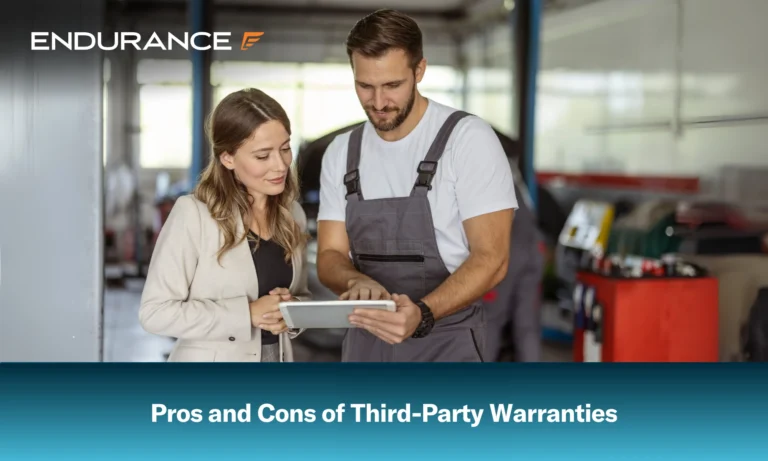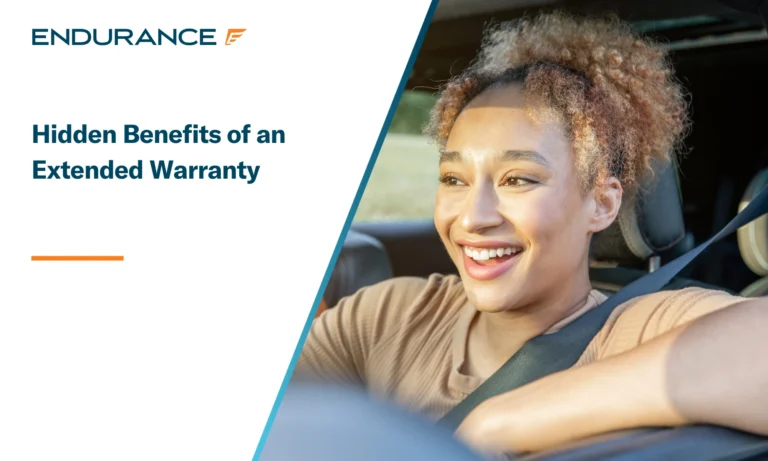Navegación por las exclusiones: comprenda qué no cubre la garantía extendida de su automóvil

Ser propietario de un vehículo es una de las cosas más liberadoras que puede hacer, pero como todas las cosas buenas de la vida, tiene un costo, y este se vuelve más caro con el paso de los años. Para mantener más efectivo en sus bolsillos, la mayoría de los conductores Invierta en una garantía extendida para su automóvil o contrato de servicio del vehículo, que cubre el costo de las facturas de reparación cuando ocurre lo peor.
Sin embargo, como en cualquier contrato, es fundamental que comprenda exactamente qué cubre antes de entregar el dinero que tanto le costó ganar. Si no lo sabe, podría llevarse una sorpresa desagradable cuando intente reclamar por el trabajo realizado. Echemos un vistazo a las garantías de automóviles con más detalle, incluido cómo abordar las exclusiones y comprender por completo qué está cubierto y qué no.
Conceptos básicos de las garantías extendidas para automóviles
Primero, vale la pena que revisemos exactamente ¿Qué es una garantía extendida del automóvil?Si no está familiarizado con el término, puede comprar una garantía extendida tradicional a través de un concesionario de automóviles o un fabricante de automóviles y, de manera efectiva, continúa la garantía de fábrica de un vehículo (también conocida como garantía del fabricante) una vez que vence.
La desventaja de este tipo de cobertura es que estás atado a los concesionarios cuando necesitas reparaciones (no es ideal si el más cercano está a 100 millas de distancia) y debes comprar la cobertura mientras la garantía de fábrica aún esté vigente. Debido a esto, los propietarios de autos usados no son elegibles.
La alternativa generalmente preferida es un contrato de servicio del vehículo con un proveedor externo, que puede ofrecer cobertura cerca del concesionario a un precio aún mejor. Los proveedores de contratos de servicio del vehículo también tienen incentivos para agregar beneficios adicionales para endulzar el trato, lo que le brinda una mejor relación calidad-precio. Las reparaciones se pueden realizar en cualquier mecánico certificado o taller de automóviles, y la cobertura se puede comprar en casi cualquier momento de la vida útil de un vehículo (buenas noticias para los propietarios de automóviles usados).
En pocas palabras, una garantía extendida es excelente por dos razones: le permite ahorrar dinero y le brinda tranquilidad. Con el costo anual promedio de propiedad de un automóvil recientemente Pasando la marca $10kLa cobertura podría ahorrarle dinero Miles de dólares al año. E incluso si no sufres una avería en el futuro cercano, solo saber que no te quedarás tirado en la carretera cuando inevitablemente ocurra lo peor vale cada centavo.
¿Qué cubre una garantía extendida del automóvil?
Lo que se considera una reparación cubierta por una garantía extendida dependerá completamente del plan de cobertura que compre, pero hay algunos tipos de paquetes básicos que casi todos los proveedores ofrecerán de una forma u otra:
Garantía del tren motriz
El tipo de protección más básico que ofrecen la mayoría de las compañías de garantía es la garantía del tren motriz, que cubre solo las piezas importantes que hacen que su vehículo siga en movimiento. Esto incluye componentes como el motor, la transmisión, los ejes de transmisión, la caja de transferencia y los diferenciales.
Garantía de inclusión
Una garantía inclusiva (también conocida como garantía de componentes establecidos) es un paso más allá de la garantía del tren motriz y generalmente cubre una gama más amplia de componentes, pero solo aquellos que están explícitamente establecidos en el contrato.
Garantía Exclusiva
El tipo más completo de garantía extendida se conoce como garantía excluyente. Esto se debe a que cubre todo lo que está debajo del capó, excepto algunos componentes enumerados en el contrato como exclusiones. Una garantía excluyente es lo más parecido a la "garantía integral" que ofrece el fabricante.
Cualquiera que sea el que elijas, lee tu contrato y luego léelo nuevamente. Presta atención Atención a la letra pequeñay regístrate solo si estás satisfecho con lo que recibirás a cambio.
Exclusiones comunes de la garantía extendida del automóvil
Hay ciertas cosas que comúnmente se excluyen de las garantías extendidas de los vehículos, como:
- Desgaste normal: Esto incluye rayones, abolladuras y otros daños estéticos que se producen con el paso del tiempo y el uso. Por ejemplo, es muy probable que su proveedor no esté dispuesto a volver a pintar un vehículo que se haya descolorido por el sol.
- Trabajo no autorizado: Si usted (o cualquier otra persona) que no esté autorizada a realizar trabajos en su vehículo sigue adelante de todos modos, las reparaciones que puedan ser necesarias como resultado no estarán cubiertas por su plan. Siempre es importante buscar ayuda profesional en lugar de solucionar los problemas por su cuenta.
- Uso indebido: Utilizar su vehículo de una manera que no fue prevista, y Su cobertura será anuladaPor ejemplo, si conduces un coche de uso diario normal fuera de carretera y se daña la suspensión, no podrás reclamar las reparaciones.
- Desastres naturales: Los daños causados por inundaciones, terremotos u otros desastres naturales generalmente no están cubiertos por las garantías extendidas de los vehículos. Esto también se aplica a casos fortuitos, como daños por granizo o rayos.
- Daños ambientales a largo plazo: El óxido y la corrosión se producen de forma natural con el tiempo, en especial si no limpias el vehículo y su parte inferior con regularidad. Este tipo de daño rara vez está cubierto por las garantías extendidas.
- Mantenimiento inadecuado: Los proveedores le exigirán que realice el mantenimiento de su vehículo con regularidad, de acuerdo con las pautas del fabricante que se encuentran en el manual del usuario. Si no lo hace, estarán en su derecho de cancelar la cobertura.
- Modificaciones: Si modifica su vehículo con piezas de recambio, mejoras de rendimiento o mejoras cosméticas, es muy poco probable que su garantía extendida las cubra.
- Problemas preexistentes: Para los vehículos con condiciones preexistentes, estas deben declararse y no estarán cubiertas por su proveedor.
Desgaste versus falla mecánica: ¿cuál es la diferencia?
El desgaste del vehículo es el daño o deterioro causado por el uso o la exposición normales. Los componentes que son más susceptibles al desgaste y, por lo tanto, se espera que se reemplacen con regularidad no estarán cubiertos por la garantía. Esto incluye elementos como bujías, neumáticos y baterías (que a menudo tienen una garantía del fabricante independiente).
Una falla mecánica se produce cuando un componente clave del vehículo deja de funcionar inesperadamente, lo que generalmente provoca una avería. Si bien esto se debe en última instancia al desgaste durante el uso, este tipo de componentes no se consideran desechables y deberían durar años, o incluso más. A diferencia del desgaste, las fallas mecánicas están cubiertas por las garantías extendidas del automóvil, pero si un componente específico está cubierto depende de su proveedor y plan.
Mantenimiento y servicios regulares
Es muy poco común que la garantía extendida de su automóvil cubra aspectos como el mantenimiento y las reparaciones habituales. Tampoco existe la posibilidad de ahorrar dinero haciendo recortes: si no realiza estos trabajos de acuerdo con las recomendaciones del fabricante, su cobertura quedará anulada por completo.
Queremos ahorrarle dinero en todos los sentidos posibles, por eso Endurance es el único proveedor de contratos de servicio para vehículos con un plan que cubre el mantenimiento regular y las reparaciones. Nuestro programa de protección Advantage incluye hasta $3,500 en mantenimiento de rutina, como cambios de aceite, además de servicios adicionales únicos, como reemplazo de pastillas de freno, reemplazo de batería y mantenimiento del sistema de enfriamiento.
Modificaciones posventa y uso inadecuado
Si bien tiene derecho a realizar modificaciones o mejoras en su vehículo, no se recomiendan por un par de razones. En primer lugar, su proveedor de garantía no estará dispuesto a cubrir esas piezas modificadas, lo que significa que tendrá que pagar la factura si fallan por cualquier motivo. En segundo lugar, si otro componente falla como resultado de una alteración o modificación, esa reparación tampoco estará cubierta.
El uso inadecuado también anulará la cobertura. Esto incluye situaciones como conducir un vehículo fuera de carretera, remolcarlo, transportarlo o sobrecargarlo por encima de la capacidad máxima de peso. A menos que esté absolutamente seguro de que su vehículo está cubierto para una actividad en particular, asegúrese de evitarla si desea mantener intacta su garantía.
Condiciones preexistentes y vehículos de rescate
Si su vehículo tiene un problema preexistente, debe informarlo a su proveedor al comprar una garantía y no estará cubierto por su plan. Un proveedor de garantía solo está obligado a pagar las reparaciones del vehículo que sean necesarias debido a problemas que ocurran después de que se haya implementado la protección y, por supuesto, los problemas preexistentes no entran en esa categoría.
Un vehículo de salvamento es un automóvil que una compañía de seguros consideró una "pérdida total" pero que desde entonces ha sido reparado o reconstruido para que pueda volver a circular. Obtenga una garantía para vehículos de salvamento, aunque puede que te cueste encontrar un proveedor que los cubra. Afortunadamente, Endurance tiene planes específicos para este tipo de coche. Así que estás en el lugar adecuado si estás buscando uno.
Cómo revisar y comprender su contrato de garantía
Antes de entregar el dinero, pídele al proveedor de la garantía una copia del contrato que vas a firmar. Una vez que lo tengas, tómate tu tiempo y revísalo detenidamente. Averigua qué incluye, qué excluye y qué puedes añadir si es necesario. Echa un vistazo también a los beneficios adicionales y a ver si tienen en cuenta determinados componentes que pueden faltar en la cobertura de la garantía principal.
No se sienta presionado a apresurarse si aún no está seguro cuando haya terminado. Comuníquese con el proveedor y haga todas las preguntas que necesite. Deben ser completamente transparentes y responderle con honestidad. Y si no está satisfecho con la cobertura que ofrece, tal vez sea momento de buscar otra opción.
Una cobertura integral que no le defraudará
Cualquiera sea su necesidad de un programa de protección para vehículos, si no puede confiar en su proveedor, no vale ni el papel en el que está impreso. En Endurance, sabemos lo importante que es un servicio de calidad para nuestros clientes, por eso lo hacemos nuestra máxima prioridad. Es una de las muchas razones por las que los expertos nos han calificado como el proveedor de protección para vehículos más confiable de Estados Unidos. Y con una alta calificación Calificación de estrellas en Trustpilot De miles de revisores, no necesita confiar solo en nuestra palabra.
También contamos con algunos de los mejores requisitos de elegibilidad del país. Ya sea que viaje al trabajo de manera ocasional, conduzca un vehículo compartido o sea propietario de un automóvil de lujo, nuestra amplia gama de planes tiene algo para casi todos. Y si nuestros planes básicos no se adaptan a sus necesidades y presupuesto individuales, estaremos encantados de diseñar un programa a medida, especialmente para usted.
Si eso no fuera suficiente, también agregamos algunos beneficios realmente geniales. Ofrecemos asistencia en la carretera las 24 horas, los 7 días de la semana, remolque, reembolso por reemplazo de viaje y costos de interrupción de viaje incluidos con cada plan Endurance. Además de eso, todos los nuevos clientes de Endurance obtienen acceso gratuito durante un año a nuestro paquete de Beneficios Elite, que incluye reparación/reemplazo de neumáticos, reemplazo de llavero, protección contra pérdida total y más. Pague una pequeña tarifa de activación de $29 y lo configuraremos.
Entonces, si desea una protección automotriz transparente de un proveedor en el que pueda confiar, llame a nuestro equipo al (800) 253-8203 o Solicite una cotización GRATIS. Tú también puedes Compre en nuestra tienda electrónica y obtenga una vista previa del precio de su plan de protección de automóvil.
Si desea seguir leyendo por ahora, tenemos muchos más artículos útiles como este en nuestro blog de garantía extendida del automóvilEncuentre temas que incluyen comparaciones de proveedores y deducibles, reseñas de autos nuevos, consejos para talleres de reparación, instrucciones de expertos en automóviles y más.













Como veterano del ejército y propietario de un taller de reparación certificado por ASE, Andrew ha hecho de la educación del conductor moderno una misión constante desde la apertura de su taller de reparación. Autospa de la ciudad del medio oeste, en 2012. Leer más Acerca de Andrew.